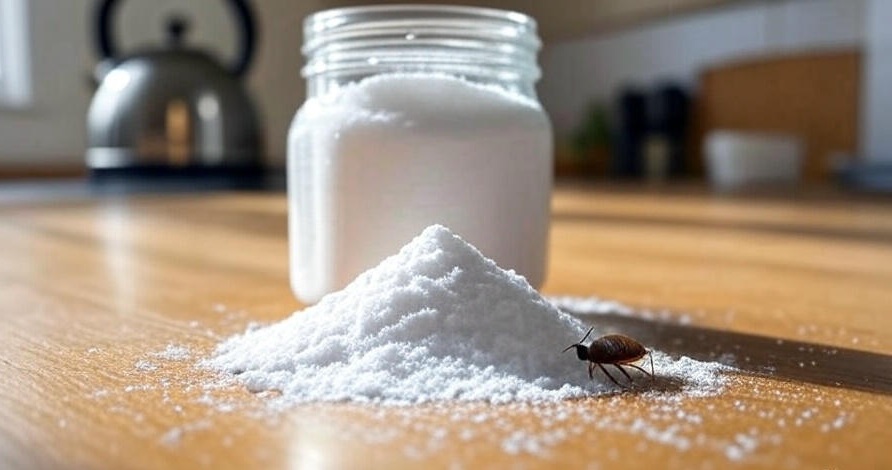
Introduction
Bed bugs are a persistent problem in London, sneaking into homes and causing sleepless nights with their itchy bites. With infestations on the rise in 2025, many people are turning to DIY solutions, hoping to save time and money. One question we hear often is: does baking soda kill bed bugs? In this article, we’ll debunk the baking soda myth, explore why DIY pest control often fails, and explain why professional help from ThermoPest is the most reliable way to reclaim your home.
Understanding Bed Bugs in London
Bed bugs are tiny, blood-feeding insects that thrive in warm, human-filled environments. They hide in mattresses, furniture, and even clothing, emerging at night to feed. London’s busy lifestyle—think crowded trains, shared flats, and frequent travel—makes it a hotspot for bed bug spread. These pests don’t care about cleanliness; they’re just looking for a warm host and a place to hide.
Why Bed Bugs Are Tough to Beat
Bed bugs are resilient. A single female can lay hundreds of eggs, each smaller than a grain of rice. Their eggs are resistant to many chemicals, and adults can survive months without feeding. This makes quick fixes like baking soda appealing but often ineffective.
A Londoner’s Struggle
Meet Tom, a London office worker who found bed bugs after a holiday. Desperate to avoid costly treatments, he sprinkled baking soda around his flat, hoping for a miracle. Weeks later, the bites continued, and Tom wished he’d called professionals sooner.
Does Baking Soda Kill Bed Bugs?
So, does baking soda kill bed bugs? The short answer is no. Despite what some online forums claim, baking soda (or bicarbonate of soda) has no proven ability to kill bed bugs. The idea stems from a belief that baking soda can dehydrate bugs by absorbing moisture from their bodies, but scientific evidence doesn’t back this up.
The Baking Soda Myth Explained
The theory suggests that bed bugs ingest baking soda, which then reacts with their stomach acids to produce gas, causing them to burst. Alternatively, some claim it dries them out externally. However, bed bugs don’t eat baking soda—they feed only on blood. Plus, their tough exoskeletons protect them from dehydration by substances like baking soda.
Why It Doesn’t Work
Studies show baking soda lacks the toxicity or physical properties needed to harm bed bugs. Sprinkling it around your home might make you feel proactive, but it won’t reduce the infestation. At best, it’s a waste of time; at worst, it delays effective treatment, letting the problem grow.
Risks of Relying on DIY Pest Control
Baking soda isn’t the only DIY remedy that falls short. Other popular methods—like essential oils or vinegar—also fail to eliminate bed bugs. These approaches can give a false sense of control while the infestation spreads. For reliable advice, the NHS bedbug guide recommends professional intervention over unproven home remedies.
Health and Safety Concerns
Some DIY methods pose risks. Overusing chemicals or scattering powders like baking soda can irritate skin, eyes, or lungs, especially in homes with children or pets. Improper treatments can also drive bed bugs deeper into hiding, making them harder to eradicate.
The Cost of Delay
Tom’s experience shows the real cost of DIY failures. By the time he sought help, his infestation had spread to multiple rooms, requiring more extensive treatment. Early action could have saved him stress and expense.
Effective Bed Bug Solutions with ThermoPest
If baking soda won’t work, what will? Professional pest control is the gold standard for eliminating bed bugs. At ThermoPest, we use advanced heat treatment to wipe out infestations in a single visit. Our method is safe, eco-friendly, and backed by a 60-day warranty. Learn more at our bed bug treatment page.
How Heat Treatment Works
Heat treatment raises the temperature in infested areas to 49°C–60°C, a range lethal to bed bugs at all life stages—eggs, nymphs, and adults. Unlike baking soda or sprays, heat penetrates deep into mattresses, furniture, and walls, leaving no hiding spot safe. You can return home the same day, with no chemical residue to worry about.
Why Choose ThermoPest?
Our London-based team knows bed bugs inside out. We use cutting-edge equipment and tailor our approach to your home’s needs. Whether you’re in a flat or a terrace, we’ll ensure your infestation is history. Plus, our transparent process and follow-up support give you peace of mind.
Conclusion
When it comes to bed bugs, myths like “does baking soda kill bed bugs” can lead you down the wrong path. Baking soda won’t solve your problem, and DIY remedies often make things worse. For a fast, effective solution, trust ThermoPest. Contact us today for a free consultation and take back your home from bed bugs.
Additional Resources
Want to learn more? Visit the NHS bedbug guide for expert advice. For details on our services, check out our bed bug treatment page or explore the ThermoPest main website.

